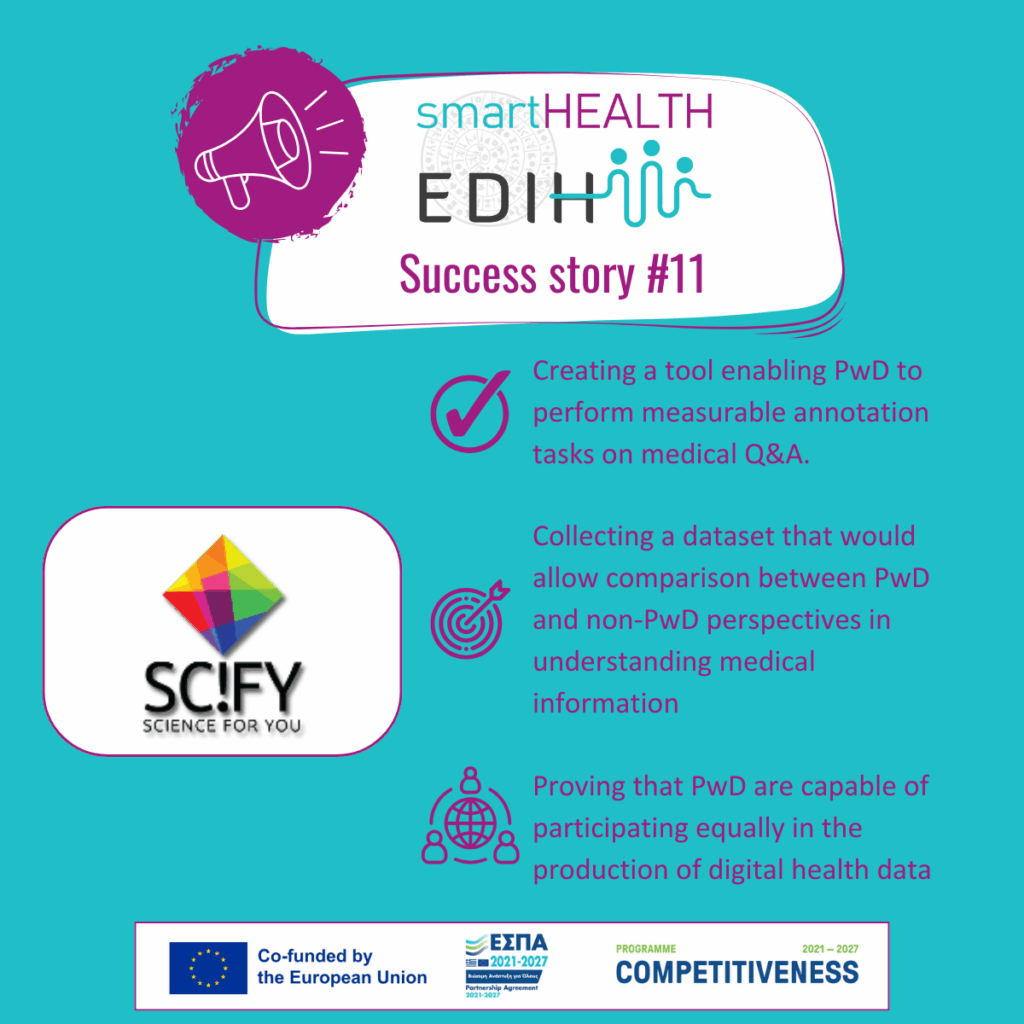SciFY Success Story: Accessibility in Digital Health: Tool enabling people with disabilities (PwD) to perform measurable annotation tasks on medical Q&A
We are happy to present the successful collaboration between SciFY and smartHEALTH. Through this partnership, SciFY effectively addressed its digital challenge, which was to enable people with disabilities (PwD) to prove their ability to perform meaningful, measurable tasks in the digital health sector.
Key Information
SciFY is a not-for-profit organisation, that develops cutting-edge information technology systems and offers them for free to everyone, including the design, the implementation details, and the support needed, in order to solve real-life problems.
- Technologies Used: Annotation Tool, Open data of medical questions and answers
- Collaboration Period: February 2025 – October 2025
- Services Provided: IT Services and IT Consulting

The Challenge
SciFY, a non-profit organization with extensive experience in accessibility technologies and social innovation, sought to develop a solution that would actively empower people with disabilities (PwD). The challenge was not only to provide access to comprehensible health information, but also to enable PwD to prove their ability to perform meaningful, measurable tasks in the digital health sector.
Society often wrongly perceives PwD as recipients of assistance rather than productive contributors. This exclusion limits their participation and wastes valuable knowledge and experience. SciFY aimed to overturn this perception through a pilot project placing PwD in the role of “co-creators” of data (Project PwD Pioneers in Artificial Intelligence).
Within smartHEALTH, the collaboration focused on:
- Creating a tool enabling PwD to perform measurable annotation tasks on medical Q&A.
- Collecting a dataset that would allow comparison between PwD and non-PwD perspectives in understanding medical information.
- Proving that PwD are capable of participating equally in the production of digital health data.
The project was implemented with support from the Ioannis S. Latsis Public Benefit Foundation and METLEN.
The Solutions
The developed solution was a web-based annotation platform for medical Q&A, designed to be simple, accessible, and effective. Its primary goal was not only to enable data collection, but to demonstrate that PwD can successfully perform such tasks like any other user.
The platform allowed users—PwD and non-PwD—to read a response and rate its clarity or usefulness via a simple interface. These ratings were stored in a database, generating an enriched dataset.
Accessibility standards were strictly applied to ensure equal participation without barriers.
The platform serves as proof of equal contribution: PwD are not just service consumers, but productive partners who can enhance the quality and clarity of health information.
The Implementation
The methodology followed an Agile approach, with iterative design, development, testing, and improvement stages, emphasizing continuous collaboration with SciFY. Feedback from the PwD community was systematically incorporated.
Key stages:
- Requirements analysis: Simplicity, accessibility, and dataset comparability defined.
- Design & development: Lightweight web environment with scalable architecture.
- Prototype: Tested by PwD users via SciFY; feedback on ergonomics and accessibility gathered.
- Optimization: Adjustments included larger fonts, clearer instructions, and simpler evaluation choices.
- Final deployment: Platform used to collect annotations from PwD and non-PwD, producing the first dataset.
The methodology proved that with proper design and structured involvement, PwD can actively and effectively contribute to digital health tasks.
The Benefits
For SciFY and the PwD community, the project produced significant technical and social outcomes:
- A pioneering annotated dataset by PwD, recording for the first time their perspective on medical information clarity.
- Identification of differences in perception between PwD and non-PwD, highlighting areas where health information requires simplification or adaptation.
Benefits for SciFY:
- Reinforced its role as an innovator showcasing PwD capabilities.
- Gained a ready-to-use platform adaptable to other health topics.
- Created a unique, high-value dataset for future projects and research.
Benefits for PwD:
- Shifted from passive recipients to active contributors in digital health projects.
- Demonstrated their value and helped change societal perceptions about their abilities.
Lessons Learned
The collaboration with SciFY was excellent and productive, as there was a shared commitment to demonstrate in practice the ability of people with disabilities (PwD) to act as equal contributors.
Factors that facilitated collaboration:
- Clear goal definition: the project was not just about software but about PwD inclusion.
- Continuous communication: SciFY gathered and conveyed PwD feedback effectively.
- Agile development: incremental improvements ensured alignment with real needs.
Lessons learned:
- PwD involvement, even via mediation, is essential for truly inclusive solutions.
- PwD can perform annotation tasks reliably, debunking stereotypes of “inability.”
- Participatory design increases both the tool’s quality and its social impact.
Key benefits:
- For us: Experience in designing accessible tools and leveraging user feedback.
- For SciFY: Proof of social mission, creation of a unique dataset, and strengthened reputation as an innovator in inclusion.
Follow “smartHEALTH” on social media for the latest news and updates: Facebook, LinkedIn, Χ.

